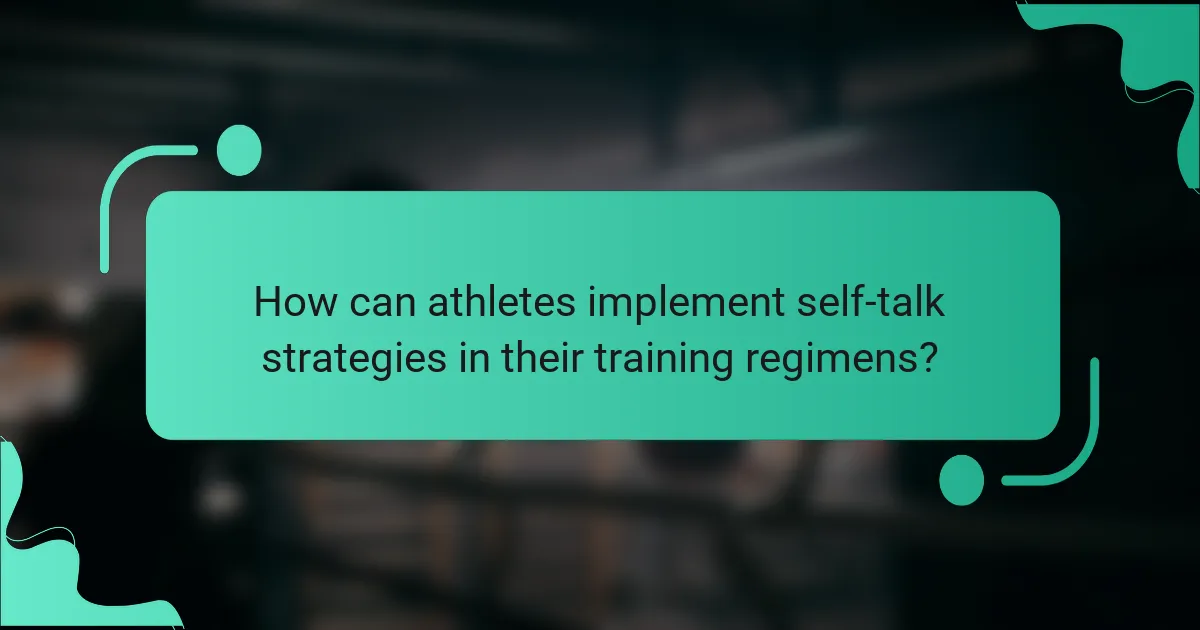Developing mental toughness is essential for enhancing performance and overcoming challenges. This article explores the role of self-talk in shaping thoughts and emotions, techniques to master inner dialogue, and unique strategies used by athletes. It emphasizes the benefits of positive affirmations, visualization, and reframing negative thoughts to boost focus and resilience. Implementing these methods can lead to significant improvements in mental performance and overall effectiveness.

What is the role of self-talk in developing mental toughness?
Self-talk plays a crucial role in developing mental toughness by shaping thoughts and emotions. Positive self-talk enhances focus, reduces anxiety, and boosts confidence, which are essential attributes for resilience. Research shows that athletes using constructive self-talk perform better under pressure, demonstrating its unique impact on mental performance. By reframing negative thoughts, individuals can cultivate a growth mindset, further strengthening their mental toughness.
How does positive self-talk influence athletic performance?
Positive self-talk significantly enhances athletic performance by boosting confidence and focus. Athletes who engage in positive self-talk can reduce anxiety, improve motivation, and maintain a positive mindset during competition. Research shows that self-talk can lead to better concentration and increased resilience, allowing athletes to push through challenges effectively. By cultivating a habit of positive self-talk, athletes can develop mental toughness, which is essential for peak performance.
What are common negative self-talk patterns among pro athletes?
Common negative self-talk patterns among pro athletes include self-doubt, catastrophic thinking, and negative comparisons. These patterns can undermine confidence and hinder performance.
Self-doubt involves questioning one’s abilities, leading to decreased motivation. Catastrophic thinking focuses on worst-case scenarios, causing anxiety and distraction. Negative comparisons can diminish self-esteem by measuring oneself against peers, fostering feelings of inadequacy.
Recognizing and addressing these patterns is crucial for developing mental toughness. Athletes can employ strategies like positive affirmations and mindfulness to counteract negative self-talk.
How can athletes identify their negative self-talk triggers?
Athletes can identify their negative self-talk triggers by reflecting on their thoughts during challenging situations. Common triggers include performance anxiety, comparisons to others, and fear of failure. Keeping a journal to track these moments can reveal patterns and help athletes develop strategies to counteract negative thoughts. Engaging in mindfulness practices further enhances awareness of these triggers, allowing for proactive management and improved mental resilience.
What strategies can replace negative self-talk with positive affirmations?
To replace negative self-talk with positive affirmations, practice consistent repetition of uplifting statements. Identify negative thoughts and reframe them positively. Use visualization techniques to reinforce affirmations. Surround yourself with supportive influences that encourage a positive mindset. Engage in mindfulness practices to enhance self-awareness and focus on constructive self-dialogue.

What are the universal benefits of mastering inner dialogue?
Mastering inner dialogue enhances mental toughness, focus, and performance. Key benefits include improved self-awareness, resilience against stress, and enhanced decision-making. These attributes foster a positive mindset, enabling individuals to overcome challenges effectively. As a result, mastering self-talk can significantly boost overall performance in various aspects of life.
How does effective self-talk enhance focus during competitions?
Effective self-talk enhances focus during competitions by reinforcing positive beliefs and reducing anxiety. Athletes who engage in constructive self-talk report improved concentration and performance. This mental strategy helps clarify goals, manage stress, and maintain motivation. Research shows that self-talk can increase performance by up to 20%, highlighting its significance in competitive settings.
In what ways can self-talk improve resilience in high-pressure situations?
Self-talk enhances resilience in high-pressure situations by fostering a positive mindset and reducing anxiety. It helps individuals reframe challenges, enabling better focus and performance. By using affirmations and constructive dialogue, one can build confidence, maintain emotional control, and enhance problem-solving abilities. This practice is rooted in cognitive behavioral principles, which show that self-talk can significantly influence mental toughness and adaptability during stressful moments.

What unique self-talk techniques can pro athletes employ?
Pro athletes can employ unique self-talk techniques like visualization, affirmations, and reframing negative thoughts. Visualization involves mentally rehearsing successful performance, enhancing focus and confidence. Affirmations are positive statements that reinforce self-belief and resilience. Reframing negative thoughts shifts perspective, turning challenges into opportunities for growth. These techniques cultivate mental toughness, crucial for peak performance.
How can visualization techniques complement self-talk for better performance?
Visualization techniques enhance self-talk by creating vivid mental images that reinforce positive affirmations. This combination boosts confidence and focus, leading to improved performance. Visualization engages the mind, making self-talk more impactful and actionable. As a result, athletes and professionals can better prepare for challenges, increasing their mental toughness.
What role does self-compassion play in an athlete’s inner dialogue?
Self-compassion significantly enhances an athlete’s inner dialogue by fostering resilience and reducing self-criticism. Athletes who practice self-compassion experience improved focus and motivation, which are critical for performance. Research indicates that self-compassionate athletes are more likely to maintain a positive mindset during challenges, leading to better outcomes. This approach encourages a supportive internal dialogue, allowing athletes to learn from mistakes instead of dwelling on failures.
How can athletes practice self-compassion through self-talk?
Athletes can practice self-compassion through self-talk by using positive affirmations and reframing negative thoughts. This approach fosters resilience and enhances mental toughness. For example, instead of criticizing themselves for mistakes, athletes can acknowledge their efforts and remind themselves that setbacks are part of growth. Research shows that self-compassionate self-talk can reduce anxiety and improve performance, making it a unique attribute in mental training. By integrating self-compassion into their routines, athletes boost focus and maintain motivation.

What are rare but impactful self-talk strategies?
Rare but impactful self-talk strategies include positive reframing, visualization techniques, and the power of affirmations. These methods enhance mental toughness by reshaping internal dialogue, improving focus, and boosting overall performance. Positive reframing involves transforming negative thoughts into constructive ones, fostering resilience. Visualization techniques allow individuals to mentally rehearse success, enhancing confidence. Affirmations reinforce self-belief, creating a strong mental foundation. Implementing these strategies can lead to significant improvements in performance and emotional regulation.
How can athletes utilize mantras for sustained motivation?
Athletes can utilize mantras to maintain motivation by creating personalized, positive affirmations that reinforce their goals. These mantras serve as reminders of their capabilities and commitment, helping to enhance focus during training and competition. Regular repetition of mantras can lead to improved mental toughness, allowing athletes to overcome challenges and stay motivated. Incorporating mantras into daily routines fosters a resilient mindset, essential for peak performance.
What is the significance of self-talk in recovery and injury management?
Self-talk significantly influences recovery and injury management by shaping mindset and resilience. Positive self-talk can enhance motivation, reduce anxiety, and foster a proactive attitude towards healing. Studies show that athletes who engage in constructive self-talk experience quicker recovery times and improved performance. By reframing negative thoughts into empowering affirmations, individuals cultivate mental toughness essential for navigating challenges. This unique attribute of self-talk plays a crucial role in maintaining focus and commitment during the recovery process.

How can athletes implement self-talk strategies in their training regimens?
Athletes can implement self-talk strategies by integrating positive affirmations, focusing on specific goals, and using cue words during training. These strategies enhance mental toughness and performance. For example, athletes can repeat phrases like “I am strong” or “I can do this” to build confidence. Additionally, setting clear, achievable objectives helps maintain motivation and concentration. Finally, using cue words during practice reinforces focus and encourages a positive mindset, especially in high-pressure situations.
What are practical exercises for integrating self-talk into daily practice?
Practical exercises for integrating self-talk into daily practice include daily affirmations, visualization techniques, and journaling. Daily affirmations involve repeating positive statements to reinforce confidence and resilience. Visualization techniques encourage imagining success scenarios, enhancing focus and motivation. Journaling allows for reflection on thoughts and emotions, helping to identify negative patterns and replace them with constructive self-talk.
How can journaling enhance self-awareness in self-talk?
Journaling enhances self-awareness in self-talk by providing a structured way to reflect on thoughts and emotions. This practice allows individuals to identify negative patterns and replace them with positive affirmations. By writing regularly, one can track personal growth and clarify goals, leading to improved mental toughness. Additionally, journaling fosters mindfulness, enabling deeper insights into self-talk dynamics. Regular reflection can transform self-perception and enhance overall performance.
What common mistakes do athletes make with self-talk?
Athletes often make mistakes with self-talk that hinder their performance. Common errors include using negative language, failing to focus on process-oriented thoughts, and not adapting self-talk to specific situations. Negative self-talk can create self-doubt, while vague or generic phrases may not effectively motivate. Additionally, athletes might overlook the importance of positive reinforcement and visualization, which are crucial for mental toughness. By recognizing and correcting these mistakes, athletes can enhance their focus and performance.

What expert insights can help athletes optimize their self-talk?
Athletes can optimize their self-talk by adopting positive affirmations, focusing on process-oriented language, and visualizing success. These strategies enhance mental toughness and performance. Positive affirmations reinforce confidence and resilience. Process-oriented language shifts focus from results to actions, reducing anxiety. Visualization techniques create mental scenarios of success, improving motivation and preparedness.
What are best practices for maintaining a positive inner dialogue?
To maintain a positive inner dialogue, practice self-compassion, challenge negative thoughts, and focus on your strengths. Use affirmations to reinforce positive beliefs and visualize success to enhance motivation. Regular mindfulness exercises can also improve your overall mental resilience.
How can athletes create a personalized self-talk plan?
Athletes can create a personalized self-talk plan by identifying specific goals and developing tailored phrases that reinforce positivity and focus. Start by assessing personal challenges and desired outcomes. Next, craft affirmations that resonate with individual experiences. Regularly practice these affirmations, especially during training and competition, to enhance mental resilience. Finally, adjust the plan based on performance feedback and evolving goals.
